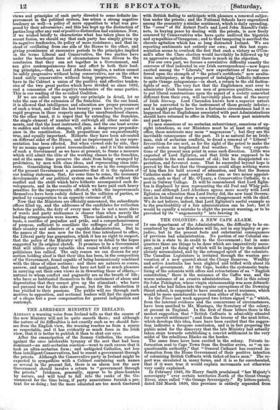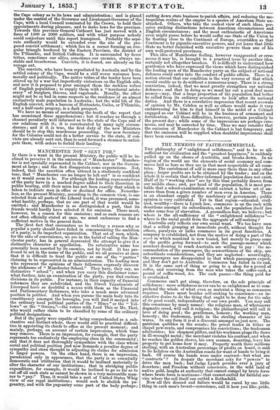TILE COLONEES : A NEW CAPE ALARM.
Is one department of the Administration, the difficulty to be en- countered by the new Ministers will lie, not in any bigotry or pre- judice, but in the present facts and substantial conseq.uences of previous bad administration. No portion of our Colonial em- pire is in a state to do credit to the Government ; but in some quarters there are things to be done which are imperatively neces- sary, and yet the doing of which will be impeded by the mischief
already accumulated, and by i the estranged spit of the colonists. i already accumulated, and by i the estranged spit of the colonists. i
The Canadian Legislature s irritated through the wanton pro- vocation of a new quarrel about the Clergy Reserves. Wealthy and active Australia has been slighted and trifled with about its mode of government. At the Cape, besides the systematic tanta- lizing of the colonists with offers and retractations of an "English constitution," there is the nuisance of the Caffre war, and the worse nuisance of an evasive administration. But in this colony Sir John Pakington, whose virgin statesmanship was soon debauch- ed, and who had fallen into the regular corruptions of the Downing Street school, is suspected to have created a novel nuisance, which would be more unendurable even than either of the others.
In the Times last week appeared two letters signed " If," which, from the internal evidence and the concurrence of circumstances, have been ascribed to Mr. Montagu, the Secretary of the colony, at present in England. In the first of those letters there is the modest suggestion that "British Caffraria is admirably situated for a convict settlement" ; and from the tenons of the next letter, which develops this idea, fears have been excited that the sugges- tion indicates a foregone conclusion and is in fact preparing the public mind for the discovery that the late Ministry had actually taken steps towards establishing a convict settlement in the very midst of the rebellious Blacks on the border.
The same fears have been excited in the colony. Private in- formation sent to Cape Town from the frontier avers, as "on un- questionable authority," that "General Cathcart has received in- formation from the Home Government of their positive intention of colonizing British Caffraria with ticket-of-leave men." The re- port was circulated in many forms, and it is so far corroborated, that if it were true it would explain movements not otherwise very easily explained.
In February 1848, Sir Harry Smith proclaimed "her Majesty's sovereignty" over certain territories North of the Great Orange ' since River, s called "the Orange Sovereignty." By letters-patent, dated 22d March 1850, this province is entirely separated from
the Cape colony as to its laws and administration ; and is placed Under the control of the Governor and Lieutenant-Governor of the Cape, with a local Council nominated by the Crown, to hold their appointments daring pleasure, and to make laws for the province. Towards this province General Cathcart has just moved with a force of MO or 2000 soldiers, and with what purpose nobody could conjecture until this report transpired. Probably the sepa- rate authority would be extended over the site of the pro- posed convict settlement ; which lies in a corner forming an irre- gular triangle bordered by the Eastern Province, the district of the T'Slambie, and British. Caffinria. It is surrounded by fierce tribes, sometimes our allies, sometimes our enemies always un- stable and treacherous. Convicts, it is feared, are already on the voyage out.
The convicts, who have been repudiated by Australia aneby the settled colony of the Cape. would be a still worse nuisance here, morally and politically. The native tribes of the border have been stirred up by a war but imperfectly victorious on the English side, and now it is proposed to pour amongst them the reckless refuse of English population ; to supply them with a "territorial aristo- cracy " of burglars, thieves, and vagabonds. Morally, the effect might not be so bad in some respects as the residence of an almost exclusively male population in Australia ; but the wild life of the English convict, with a hareem of Hottentots, Gaika, or rfflambie, and a half-caste progeny, is a dark prospect.
We have no means of ascertaining the truth of the report that has occasioned these apprehensions ; but it reaches us through a channel peculiarly well informed as to the state of the Cape and of our relations with it; it is corroborated by many ugly circum- stances; and if it is true, the first duty of the new Ministers should be to stop this murderous proceeding. Our new Secretary for the Colonies could not do a better service to the state, if con- victs are already sent out, than to send forward a steamer to antici- pate them, with orders to forbid their landing.

































 Previous page
Previous page